

In this free present simple information gap activity, students complete a text about a football player's routine on matchday by asking and answering Wh questions. In two groups, students complete the present simple Wh questions they need to find out the missing information in the text on their worksheet. Next, students pair up with someone from the other group. Students then ask the present simple Wh questions to their partner and complete the gaps in the text with their answers. Afterwards, students compare worksheets to check their answers.
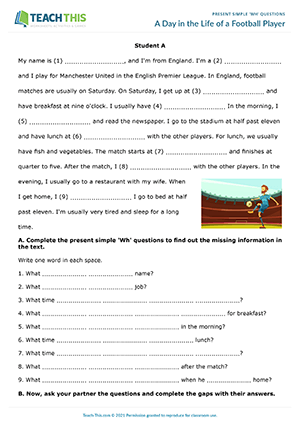


In this present simple questions speaking activity, students practice asking Wh questions about personal information. The students' task is to take on the identity of a person at a party and complete the missing information on their worksheet about other people at the party. Students go around asking present simple Wh questions to the other people in their group and they complete their worksheet with the missing information. When the students have finished, they report back to the class on the people they met at the party using the present simple.
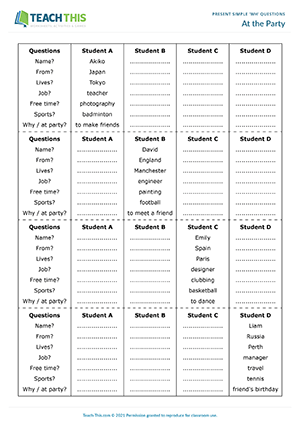


In this insightful present simple Wh questions activity, students ask and answer questions to find people with the same habits and routines. Students begin by forming present simple Wh questions from prompts. Students then write answers to the questions in the column marked 'You'. Next, students go around the class asking and answering the questions to find people with the same answers. When a student finds someone with the same habit or routine, the two students write each other's names on the worksheet. Afterwards, students give feedback to the class on what they found out.
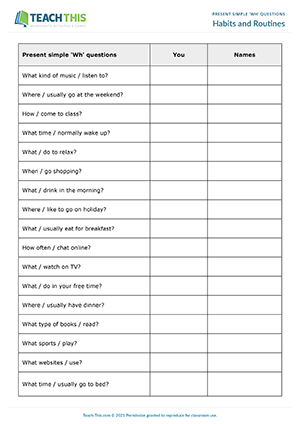


This productive present simple information gap activity helps students to practice asking and answering Wh questions in the third-person singular. In the activity, students exchange personal information about four people in order to complete missing information in a chart. Students take turns asking present simple Wh questions from the prompts to their partner and completing the chart with their answers. Afterwards, students compare worksheets to check their answers.
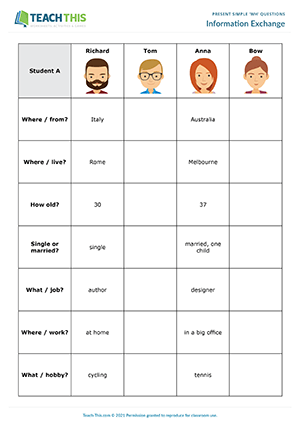


This free present simple Wh questions worksheet helps students learn and practice Wh questions in the present simple tense. Students start by matching each question word with its correct usage. Students then complete present simple questions with a suitable question word. Next, students sort the questions into the correct columns, according to their grammatical form. Lastly, students write present simple Wh questions that elicit a set of answers.
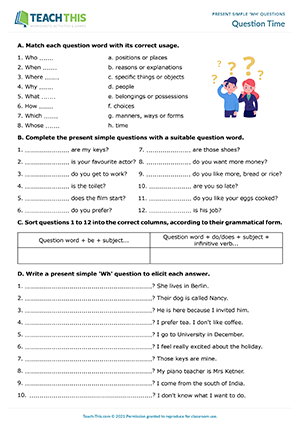


In this interesting present simple Wh questions with do activity, students ask and answer questions in the third-person singular in order to complete information about four people's free-time routines. In pairs, students take turns asking their partner questions to complete information about the four people's free-time routines, e.g. 'What does Nora do on Saturday afternoons?' Their partner looks at the corresponding information in the chart on their worksheet and makes a present simple sentence using the third person, e.g. 'She goes to the park.' The other student then writes the activity in the chart. This continues until both students have completed their charts.
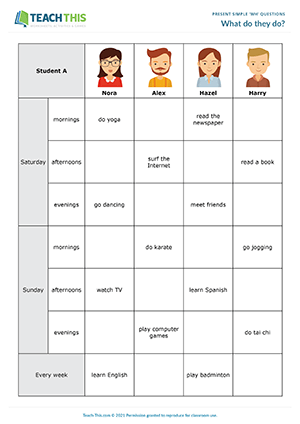


In this amusing present simple questions game, students ask a series of questions and their partner delays their answer to each question until the next question is asked. Student A begins by asking present simple What questions to their partner, who delays their answer to each question until the next question is asked. For example, when Student A asks the first question 'Where do you go swimming?', their partner doesn't reply. When Student A asks the second question 'Where do you cook?', the student replies to the first question, e.g. 'In a swimming pool.' When the students have finished, they swap roles and Student B asks their present simple Why questions. Afterwards, students create their own list of ten present simple questions using one type of question word and play the game again with a different partner.
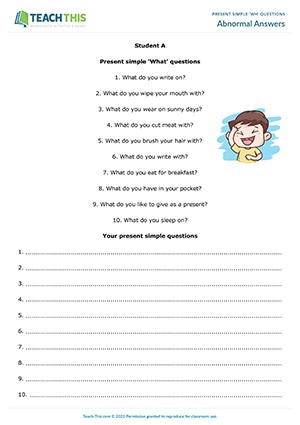


In this useful present simple speaking activity, students find out information about their classmates' habits and routines by asking and answering Wh questions. Give each student a question card about routine activities. The students' task is to find out the answer to the question on their card by speaking to everybody in the class. Students go around the class asking and answering their questions and noting down their classmates' responses. When the students have finished, they take turns reporting back to the class on the information they found out.
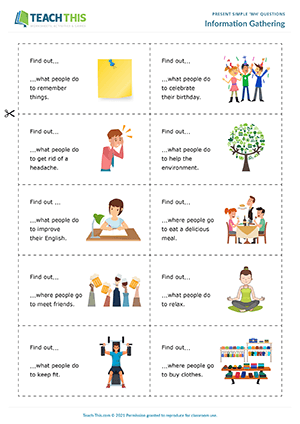


In this free present simple questions activity, students ask and answer Wh questions about daily routines. In pairs, students take turns interviewing their partner about their daily routine and writing their answers in sentence form. When both students have finished, they compare their daily routines and look for similarities and differences. Pairs then take turns reporting back to the class on the information they found out. As an extension, students write a paragraph about their partner's daily routine in the present simple.
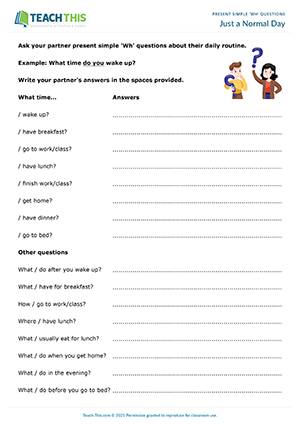


This engaging present simple questions activity helps to teach students how to ask and answer questions about habits and routines. To begin, students complete present simple sentences on the worksheet about their habits and routine, e.g. 'In the evening, I usually watch TV at home.' Students then work in pairs and write down present simple Wh questions that correspond to the sentences, e.g. 'What do you usually do in the evening?' Next, students go around the classroom asking and answering their questions. When a student finds someone with the same answer, the student says Likewise. The two students then write each other's names in the last column of the worksheet. Afterwards, students discuss their findings with the class.
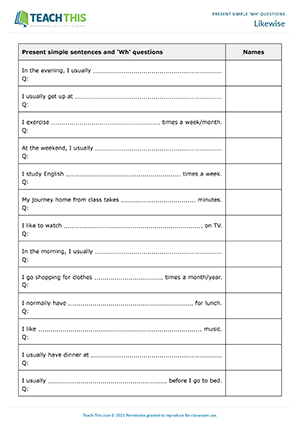


In this present simple error correction activity, students correct mistakes in third-person singular Wh questions and then use the questions to interview a partner about someone they know well. Students start by finding six mistakes in present simple Wh questions and correcting them. Next, students take turns checking their corrections with their partner, who has the answer key. After that, students interview their partner about a person they know well using the 12 questions on their worksheet. Finally, students tell the class what they found out.
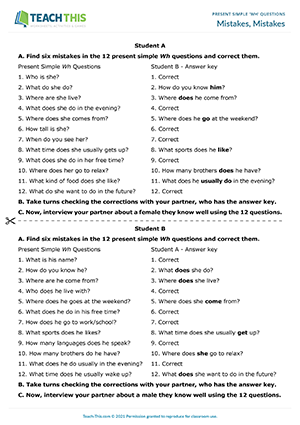


In this enjoyable present simple speaking activity, students practice asking and answering Wh questions with the verb to be and do. In groups, students take turns picking up a card and asking the other students in the group a present simple Wh question by adding do, does or the verb to be to the question prompt on the card. The other students then respond in turn. When the question has been fully answered, the next student picks up a card, and so on. Afterwards, students give feedback to the class on what they found out about their classmates.
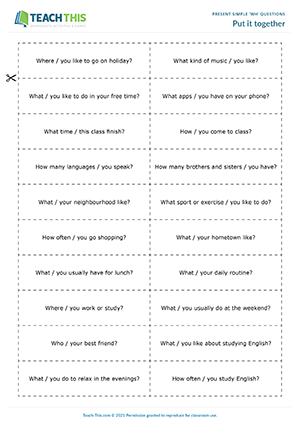


In this present simple speaking activity, students practice forming, asking and answering present simple Wh conversation questions. First, in two groups, students complete each present simple Wh question with the verb to be or do, you or your, and the verb in brackets where shown. Students then pair up with someone from the other group and take turns asking and answering the present simple conversation questions with their partner. Afterwards, students share what they found out about their partner with the class.
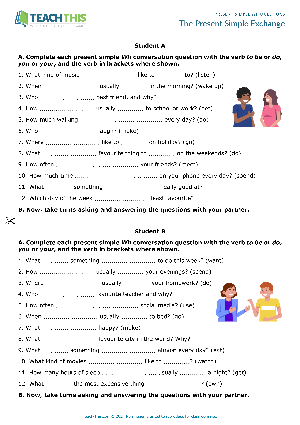


In this fun present simple questions board game, students practice asking and answering Wh questions about daily routines and habits. Players take turns rolling the dice and moving their counter along the board. When a player lands on a square, they pick up a true or false card and look at it. The student on their right then asks the player a present simple Wh question from the prompt on the square. The player gives a true or false answer in sentence form, according to the instructions on their card. If a player lands on a question mark square, the student on the right can ask any present simple Wh question they like. All the students, including the one who asked the question, guess whether the player’s answer is true or false. The player then reveals the answer. Each student who guessed correctly scores one point. When a player reaches the finish, the game ends. The player with the most points wins the game.
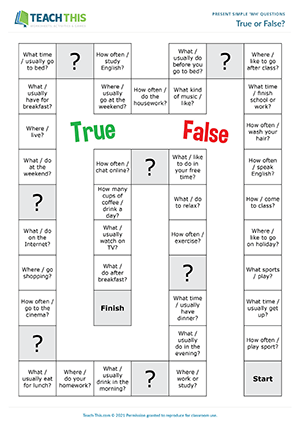


Here is a fast-paced present simple questions game to help students practice making Wh questions. In groups, students take turns picking up a card and asking as many present simple Wh questions as they can about the topic on the card in two minutes. Students ask their questions to the other group members in turn. Students score a point for each correctly formed present simple Wh question they ask relating to the topic. Each question must be answered by a group member before the student can ask another question. The student with the most points at the end of the game wins.